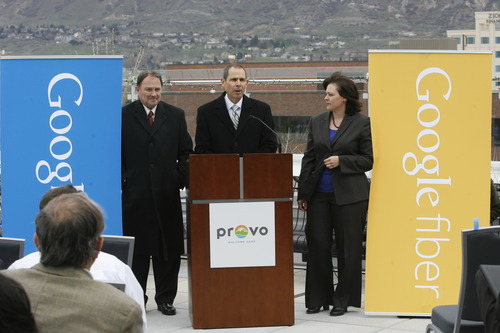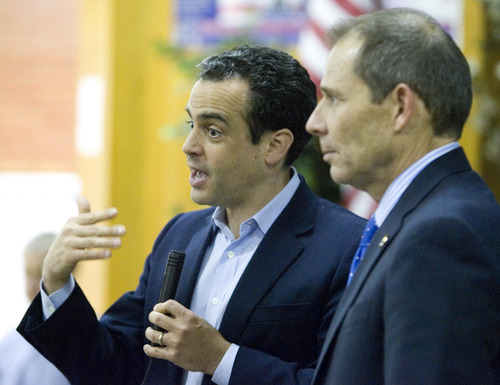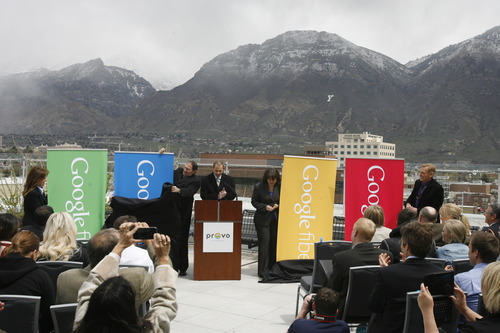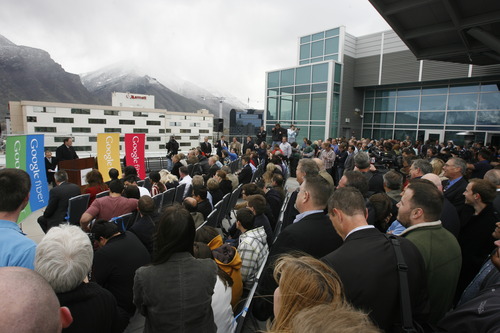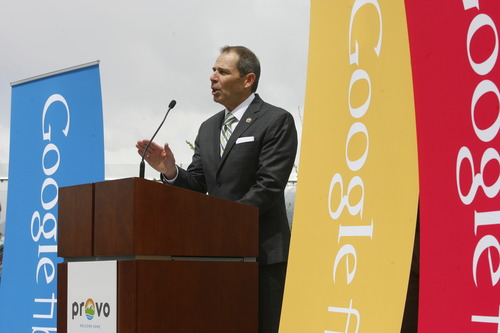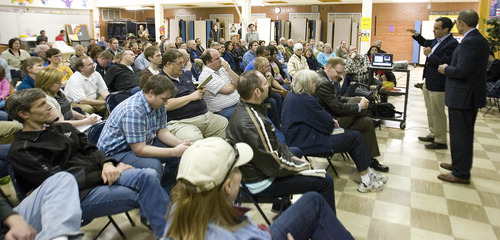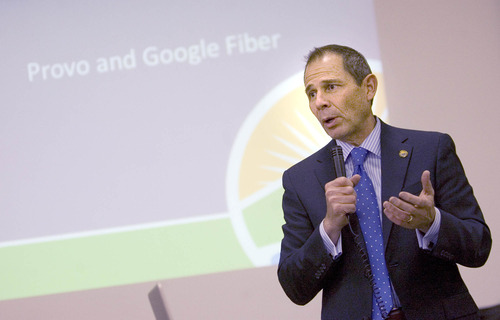This is an archived article that was published on sltrib.com in 2013, and information in the article may be outdated. It is provided only for personal research purposes and may not be reprinted.
Provo • Mayor John Curtis knew the moment he took office in January 2010 that iProvo would be his biggest headache.
Provo's high-speed fiber-optic network was seemingly on a path to nowhere. Taxpayers owed money for it. Customers weren't subscribing to it. And worst of all, the network itself was already aging.
"The media described it as a millstone around [the previous administration's] necks," Curtis said. "There was a kind of a gloom-and-doom with this."
Three years later, though, Curtis' headache appears to be cured. In April, the city made a deal with search-engine giant Google to buy iProvo as part of the famed Google Fiber network.
Provo joins Kansas City, Mo., and Austin, Texas, as one of only three cities with Google networks. The city is happily out of the Internet business and will get what it hopes is a first-class network operated by one of Silicon Valley's most successful companies.
But the path wasn't always easy.
—
Visionary idea • Like the Utah Telecommunication Open Infrastructure Agency (UTOPIA), iProvo was conceived on the notion that businesses and individuals soon would require fast, ubiquitous Internet service.
Provo officials completed construction of iProvo's infrastructure in 2004. The fiber-optic network would bundle television, telephone and Internet service over one network, just as UTOPIA promised it would. The city forged partnerships with Internet service providers under which Provo would own the network and the ISPs would sell the service.
The city issued $39 million in bonds to pay for iProvo, committing to monthly payments of $278,000 for 20 years. But that didn't prove to be the network's only cost.
Some of the ISPs either went out of business or could not keep up with the payments to Provo to offset the $278,000 monthly debt service. The provider that remained, Broadweave Networks, merged with Veracity Networks in hopes of improving its financial position. In 2008, Broadweave/Veracity bought iProvo and took over the monthly bond payment but was unable to make a go of it on its own.
But iProvo revenue just wasn't enough, said Dan Follett, Provo's division director of finance and the lead person on the Google Fiber project.
Once it covered its operational expenses, "The network wasn't producing enough revenue to cover the debt service," Follett said. Provo officials won't say how many customers iProvo has or had back then because Veracity is privately owned.
iProvo's financial instability prevented Veracity from hooking up more homes to the network. Residents had to be willing to pay the $700 installation fee themselves, and many weren't. Eventually, iProvo ownership reverted back to the city. Provo was back in possession of a network that was neither growing nor making money.
—
Network for sale • Curtis made resolving the iProvo debacle a priority.
"I always viewed my job was not deciding if this was a good decision to [build iProvo] but rather — now that we've done it — figure out what was the best thing to do with it," he said.
In November 2011, city officials began charging $5.35 a month on residents' power bills to pay the bond payment.
But the question of what to do about iProvo's aging technology remained.
"We were essentially getting back [from Veracity] a network that was a 2004 design, 2004 vintage equipment," Follett said. "One of the concerns was how do we manage and upgrade this network over time?"
City officials only choice? Try to sell iProvo.
"We went hard out to the market," Curtis said. "We hired a consultant, a lobbyist in D.C., talked to a broker quite a bit ... contacted all the competitors in the area."
Curtis said there were at least four or five serious inquiries, but none of the negotiations led to an offer. Then in March 2011, Google announced it would go into the fiber-optic network business with Google Fiber and identified Kansas City as its first market. Curtis assembled a team and started negotiations with Google.
Google promised upgrades to iProvo and free access to residents in exchange for ownership of the network. Google would own iProvo, but Provo would still have to pay off the remaining 12 years of its bond.
In the end, Google offered little explanation for why it chose Provo.
"We were excited about the opportunity ... to help the community to realize its original vision," is all Kevin Lo, Google Fiber general manager, would say.
Curtis said having the network in place helped, but the city's quality of life got Provo the deal.
"Our team did an awesome job of capturing their attention, of letting them see the potential of Provo — this fabulous entrepreneurial base that is high-tech," he said. "They really did value that our city took a chance on this [network] early on. We were an early adopter, and they wanted to reward that."
—
Not for UTOPIA • What was good for Provo, may not be good for UTOPIA and its 11 cities, said UTOPIA board member Kane Loader, who is also Midvale's city manager. Fundamental differences between iProvo and UTOPIA make it more difficult for UTOPIA to secure a similar deal with a company such as Google.
"It would be a much more complicated deal," said Loader, who admitted that if Google presented UTOPIA with the same offer as iProvo's, he doesn't know if UTOPIA would take it. "You would need to break up UTOPIA into individual cities or put a couple of cities together. But to take on 11 cities, that would be a monumental task."
But Provo's Follett suggests that UTOPIA executives keep pushing for a solution.
"You have to be persistent, you have to keep exploring all ideas and all options."
What is iProvo?
The $39 million fiber-optic network Provo built in 2004 is capable of Internet connection speeds up to 100 times faster than a regular cable modem. Provo issued a 20-year bond to pay for iProvo.
Last month, Provo sold the network to Google. No money was exchanged in the deal. Instead, Google promises to upgrade the network and provide free lower-tier Internet connections to residents for seven years.


